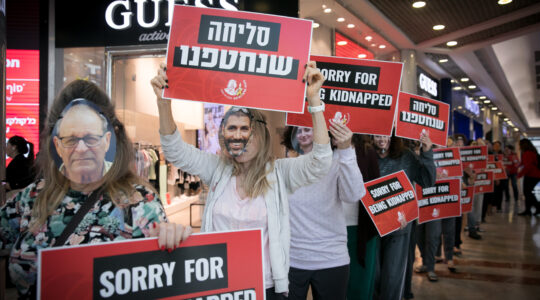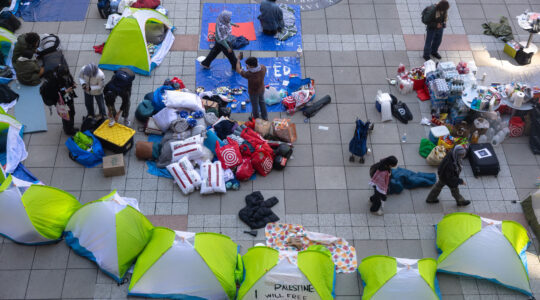NEW YORK (JTA) – Don’t expect Howard Rieger to spend his last year on the job quacking.
Rieger, the president and CEO of the United Jewish Communities, told JTA this summer that he plans to play the heavy during the next dozen months as he works hard to make sure that the relationship between the UJC and the network of North American Jewish federations becomes fully functional.
Since its inception in 1999, the UJC has been faced with an identity crisis: While the organization has tried to establish itself as the flagship for the federation system, the local federations have been insisting on the dominant role. And all of this has happened as the federation fund-raising campaigns that the UJC was supposed to help have continued to stagnate, and in some cases fall.
But it looks like Rieger has another major problem to sort out: As the UJC and the federations wrestle domestically over who is the parent, their main two overseas aid partners – the American Jewish Joint Distribution Committee and the Jewish Agency for Israel – are caught in an intense sibling rivalry.
All told, the federation system annually sends $137 million in unrestricted core budget funds to the Jewish Agency, which promotes aliyah, helps absorb immigrants upon their arrival in Israel and promotes Jewish education worldwide. The JDC, an international relief and rescue organization that helps Jewish communities worldwide as well as disadvantaged segments of the Israeli population, receives $42 million.
Ideally the two organizations should coordinate efforts to maximize their effectiveness and keep down costs. In addition, the federations should be able to count on their overseas partners for solid information to help set budget and programming priorities in an ever-changing world.
Years of wrestling for a piece of a shrinking funding pie, however, have left all sides suspicious, thus complicating efforts to arrive at the best plan for identifying and aiding needy Jews and Jewish communities.
In the most recent manifestation of the simmering tensions, federations and their partners tried to figure out how to help the Jews caught in the crossfire in the recent war in Georgia.
Both overseas aid agencies struck quickly in their attempts to get money from UJC. The Jewish Agency put in for around $600,000 to help Georgian Jews make aliyah and help settle them in Israel; the JDC initially requested roughly $1.4 million to help Jews still on the ground in the war-torn area.
No one is accusing either organization of inflating numbers. But the air of distrust lurks, especially with both overseas service organizations generally beating the drum for more money – and UJC officials frustrated over what they view as repeated attempts to use the media to pressure them into complying.
It didn’t help that the JDC asked for nearly three times as much as the Jewish Agency – nearly the inverse of the current formula used by UJC to distribute funds to the two organizations. (The JDC has dropped its request for Georgia to about $800,000, saying its initial estimate of the number of Jews living in the affected area was too high.)
To understand the latest chapter in the up-and-down relationship, one must look at the beginning of the decade, when the Jewish Agency and JDC found themselves essentially pitted against each other following the 1999 merger that created the UJC.
Specifically, the establishment of the UJC’s Overseas Needs Assessment and Distribution Committee, known as ONAD, ended up forcing the two sister organizations to wrestle each other for every dollar that the federation system raised for international needs. And those negotiations often became drawn-out battles that sometimes were openly nasty – with each side seething when it lost.
The UJC scrapped ONAD in 2003 in favor of its former practice of using a set formula to divvy up the core budget money that federations raise between the Jewish Agency and JDC. But the emotional damage was done – members of both the Jewish Agency and JDC boards already had brought the sourness home to the board rooms of their local federations.
To be sure, the relationship has shown signs of improvement in recent years.
When the federation system raised an additional $360 million in emergency funds in the wake of Israel’s war with Lebanon in 2006, the three organizations managed to collaborate. They split the money to provide immediate relief to Israelis on the ground, and help build infrastructure and beef up the economy in Israel’s North.
They were able to establish a system for identifying the entirety of Israel’s need, launch programs to address those needs and secure the required funding to keep them running. If they had not worked together, the system would have wasted some $60 million in overlap, according to the UJC’s chairman, Joe Kanfer.
Publicly, high level officials at the Jewish Agency and the JDC say they have never worked better together. But a behind-the-scenes view reveals a less rosy story.
Under the agreement that replaced the ONAD process, 75 percent of the dollars go to the Jewish Agency and 25 percent to the JDC.
It’s no secret that the JDC has not been happy with the 75-25 split, especially since the level of aliyah has significantly dropped since the arrival of hundreds of thousands immigrants from the former Soviet Union during the 1990s. The deal that established the funding formula ends this year, and negotiations between the organizations over a new agreement have stalled – most recently after the JDC backed away from the table at the last second after the Jewish Agency and the UJC both thought they had an agreement to continue the 75-25 arrangement.
Jewish Agency officials, in particular, felt burned. And tension between the Jewish Agency and the JDC is rising again as the economy falters, the dollar falls against the shekel and donors become tighter with their charity. Both organizations are feeling a budget crunch, and both again are trying to pressure the UJC into giving them more money – money that the UJC simply does not have.
The jostling has produced plenty of gamesmanship among the three organizations, an odd funding triangle, where the Jewish Agency and the JDC are holding hands as they work together to pressure the UJC for more money in general, and then kicking each other under the table as they each hope to take home a larger share of whatever they manage to extract from the federations.
It is a relationship that one high-level official called “dysfunctional,” and not surprisingly has produced mistrust – both on the part of the UJC for its two overseas service agencies, and of the two agencies for each other.
So as Rieger enters his last year in office, he not only needs to figure out how to get the UJC and the federations working better together, but how to get the Jewish Agency and the JDC on the same page. Otherwise, they all could be sitting ducks.
(This article was adapted from Jacob Berkman’s blog, which can be found at www.fundermentalist.com.)





